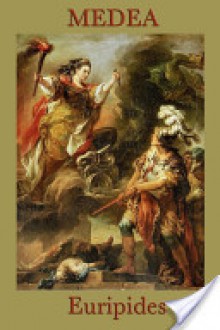
Surely, of all creatures that have life and will, we women
Are the most wretched. When, for an extravagant sum,
We have bought a husband, we must then accept him as
Possessor of our body. This is to aggravate
Wrong with worse wrong. Then the great question: will the man
We get be bad or good? For woman, divorce is not
Respectable; to repel the man, not possible. (Trans Phillip Veracott)
These few lines near the opening of Euripides' Medea pretty much describes what life was like for women in Ancient Greece: it was not pretty. What struck me when I read this play again (and it is one of my favourites) is how astute Euripides was to the plight of Greek women, and it was not as if it was any better elsewhere. Granted, women did have more rights in Ancient Rome (and would become very astute political maneuverers, such as Nero's mother Agripina) but in general the freedoms that women have won over the past 150 years are probably the furthest that they have come to participate in society than any other time throughout history (with a few exceptions).
I should talk about about the play and its background (the legend that is, not the writing of it, which took place just prior to the Peloponesian War). The play is set sometime after Jason's return to Greece after obtaining the Golden Fleece from Cholchis. When he was in Cholcis, he had wooed Medea, the daughter of the king, and with her aid managed to steal the fleece and escape, but in doing so Medea was forced not only to kill her brother but renounce her citizenship of Colchis never to return. Years later, after they returned to Greece, Jason and Medea married and had children. However, Jason received an offer from King Creon of Corinth to marry his daughter and thus take the throne, so he pretty much ditched Medea, arranged for her exile, and shacked up with his new wife.
If I can describe the play in one sentence, it would be 'hell hath no fury like a woman scorned'. Let all men out there understand this, and if there is one piece of literature I would recommend that all men who wish to have a relationship with a woman should read it should be this one. It is not so much that Medea is a noble character, she is not. She poisons Jason's wife and father-in-law, and then proceeds to murder both of her children, and this is after she forced an oath out of the King of Athens to provide her protection, no matter what. Medea is not a lovely person, and despite the argument that she was driven to this point by a nasty man just simply does not cut it. I agree that Jason is not a noble man either, but still does not justify Medea's actions.
One can simply feel the pain of Medea in this play as she struggles with this change to her life. Yes, she acts on instinct and out of vengeance, but she has renounced her country and her people and fled to an alien land, all over the love of a man, only to discover that this man discards her once she is no longer needed by him. As she says, a Greek woman still has family and friends, whereas she has nobody (not quite true, as she secured sanctuary in Athens). We are reminded, over and over again, of the plight that is to be a woman, and an alien woman, in Ancient Greece, and it is not pleasant.
Does Euripides' write a decent female character then? Well, that is difficult since we have fragments of only one female Greek poet, and that is Sappho. Everything else is written by men, though not necessarily about men. I believe Medea's character is representative of a woman scorned, seeking vengeance upon he who discarded her. She cries, and is in deep emotional pain, but then lines like 'it is the nature of a woman to cry' is clearly the writing of a man. However Euripides is different from the other Greek playwrights in that he stands up for the woman, and we see this clearly in this play. There are others where he covers such themes as well, but we will look at them when we do. Further, not all of Greek literature deals only with strong men and weak women. Homer's Odyssey is a clear example of this as Penelope is painted as a strong, loyal, and dedicated woman that we resist even the wise men to remain faithful to a husband that she believes is still alive. Further, we have gods like Athena and Artemis, who clearly break out of that mould that we like to put Greek women into (both of these gods are major gods, not married to any other gods, are warriors, and are worshipped by many Greeks of the time).
Another thing that struck me in this play this time is the nature of children. Medea weeps about how it is difficult to know how a child turns out. Is all that time wasted in raising the child, only to see him either turn bad, or die in a war? Many parents fret and worry about that, and sometimes the more we worry, the less we actually look into ourselves and ask what can we do to make the situation better. This is a fallen world, and people die in fallen worlds: it is a fact of life. Death will always be painful, but sometimes we need to accept this. The more we try to mould our children into what we want, the more we force them away from us: many a piece of literature explores this (especially these days, just see Dead Poet's Society). However, Medea slays her children, if only out of spite.
I have heard many people suggest that Christianity has made the world worse, not better, and that is something that I must heartily dispute. All we need to do is to look at the pre-Christian world to see how horrid and barbaric it was. In many of the Greek tragedies there are no noble characters. There are only two truly noble characters that I can think of in Greek antiquity, one of them being Penelope, the other being Leonidas. Athens, the beacon of freedom and democracy, oppressed women and maintained a slave economy. Further, during the early days of the Peloponesian War, they attacked the island of Mytilene, sacked the place, killed all of the men, and enslaved all of the women and children. While we may have had issues with the way the United States (and Britain) have acted in other lands, I cannot think (with the exception of the period of slavery) of any time where they have acted in such a way. Further, while birth control has always been around, the ancients would deal with unwanted pregnancies by breaking the baby's legs, and then leaving them in the wilderness to die.

 Log in with Facebook
Log in with Facebook 






